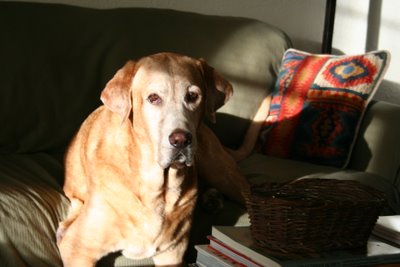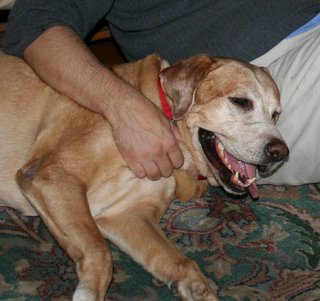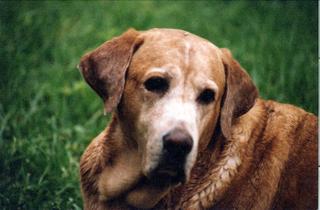March 25, 2006
Wintering into Wisdom

"So learn from this and understand true values. I who tell you have wintered into wisdom." -- Hrothgar in the Seamus Heaney translation of Beowulf
Over the last year or so, I've noticed that humans have started making not-so-veiled references to my age. Just for instance: several blocks down the road, there live a couple of frollicking, rollicking Labs who often greet Mike and Lucy and me with the kind of butt-shuffling, springy-legged, full-bodied enthusiasm common among sporting dogs. One them was trying to puppy play with me when his human told him to calm down because I'm an "elder statesman."
Another man called me an "old timer" when I was walking through the alley the other day, and many folks have more politely asked my age (currently 8, by the way).
Well, okay. It's true that I'm getting a bit gray around the muzzle. I've been telling myself it's premature since my mom was a very light buff-colored Lab compared with my fox-red dad. But I also know that age really is creeping up on me, as it does on all of us. I'm a little stiffer on my bad back leg in the morning than I used to be, a little more cautious as I come up the stairs with the newspaper.
We Labs are not terribly introspective. We tend to take life as it comes. But lately I've noticed some changes. For example, I no longer jump up indescriminately when the refrigerator door opens. I just listen from the other room. Someone rumaging through the vegetable drawer holds little interest. I don't even lift my head at the sound. The sound of rustling plastic is different. I may raise an eyebrow to that. And if it's exactly the right kind of rustling plastic and if it's preceded by the sound of an opening meat drawer, then I'm willing to expend the energy to get up and mosey into the kitchen. The promise of a taste of deli turkey or ham makes the trip worth it. And, if I limp just a little, playing the age card, I'm almost sure to score something.
Yes, a certain wisdom - or even wiliness - is one of the recompenses of age. The sliced pepperoni tastes a little sweeter today than it used to, being won by dint of fine mental calibration rather than the constant, unnuanced begging of my puppyhood. Likewise, I now know when to bark at the door and when to just let neighborhood noises pass, when to stay in the shade during walks in the Florida sun and when to brave the heat, and when to just ignore another crack about how I'm getting older. An older dog knows, after all, that life is fleeting and shouldn't be wasted on trivia. In fact, the need to savor each sweet moment is one of the tricks that we older dogs can teach.
March 12, 2006
Some Days Anything Seems Possible
March 04, 2006
Doggedly in Love

Do humans really love?
It's one of those philosophical and scientific questions that the more dogged among us sometimes ask ourselves. In this instance, the question is spurred by an entry (a series of entries, actually) in a blog that I read called Dogma, written by Gina Spadafori. (Mike has her Dogs for Dummies book, a fact that's likely made him a bit easier for me to train.)
Apparently, there are humans who believe that dogs are incapable of love, which is interesting considering the current state of the human-run world. There are wars in which humans who all say they believe in God seem Hell-bent on killing each other in the most horrible ways over matters that are maddeningly unclear to your average canine. There are human growls of hate that spread like venom all over the Internet, human-on-human massacres and mass mutilations the world over, and the development of incalculably cruel weapons capable of destroying millions and perhaps billions. And all this from the one species on the planet capable of love?
I don't know. Maybe humans are just creatures of instinct, little more than sock puppets driven by chemicals and conditionings of which they're barely aware.
Take the case of romantic love, on which so much of human art depends. An article in the LA Times notes that "recent research suggests that romantic attraction is in fact a primitive, biologically based drive, like hunger or sex." Humans know this by sticking each other in magnetized metal tubes (what other species would create such a thing?) and watching how their brains work. The evidence reportedly shows that "the neural mechanisms of romantic attraction are distinct from those of sexual attraction and arousal."
There's something about dopamine receptors and states of euphoria and craving. Being in love is apparently a lot like being addicted to some mind-altering substance that makes you feel wonderful, which may be why humans in love seem to a lot like cats who've had a healthy dose of catnip: happy and wacky and purring with desire.
Here's a bit of irony for the dogs-can't-love group: one of the ways in which humans have studied romantic love is by studying animals during courtship. Dr. Helen Fisher, author of Why We Love, did research in which she looked at various chemical compounds in the human brain because the "attraction animals feel for particular mates is linked with elevated levels of dopamine and/or norepinephrine in the brain." Not so surprisingly, "all three of these chemicals produce many of the sensations of human romantic passions."
Yes, I know there are human loves other than romantic love. There are many kinds of important, emotional bonds that form between people who need people, who are reportedly the luckiest people in the world. But what would those MRI machines show if we looked at the bonds that people feel for family members and bonds that dogs feel for their pack members? I suspect (though I don't wish to be crammed into a metal tube to find out) that the brain patterns would be somehow similar, just as the chemical processes inside courting animals and courting humans are similar.
We species of the Earth are not, perhaps, so dissimilar as some believe. Which both gives me comfort and makes me wonder. It gives me comfort to believe that humans really can feel love, despite their unmatched propensity for horrific violence and hate. But it makes me wonder if we dogs are really as admirable as some believe. If we were given opposable thumbs, would we also devise such instruments of destruction? And would we begin to believe that other species, no matter how clever, are little more than biological machines?

